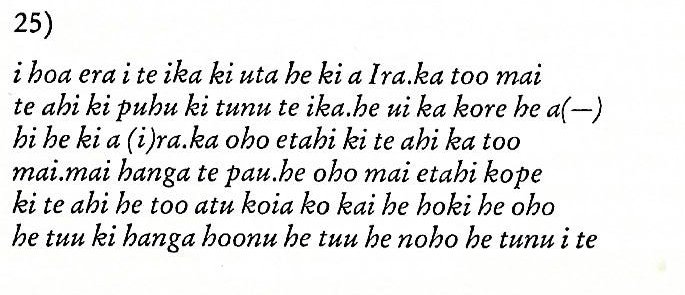

| he oho hokoou mai
he tuu ki hanga hoonu |
Again
they went on and reached Hanga
Hoonu. They saw it, looked around,
and gave the name 'Hanga Hoonu A Hau
Maka'.
On the same day, when they had
reached the Bay of Turtles, they
made camp and rested [he hakaora]. |
| he ui he tikea
he nape i te
ingoa ko hanga hoo(-) |
|
nu.a Hau maka.i
tau raa ana i
tui ai |
| ki hanga hoonu.he
noho he hakaora. |
|
Tui.
1. To sew mats, to make
strings. E-tahi tuitui reipá i Te
Pei, ekó rava'a e-varu kaukau;
i-garo ai i Hiva, i te kaiga, a
necklace of mother-of-pearl is on
te Pei, few will find it (lit:
eight groups of people); it has
remained in Hiva, in our
homeland. 2. The three stars of
Orion's Belt. Vanaga. |
| i ka ui
atu nei
anake ko te ika e noho era.ku |
They all
saw the fish that were there, that
were present in large numbers - Ah! |
| kake ana ku kake
ana e noho era
aa.he u(-) |
| Atu.
Particle of meaning opposite to
that of mai; it refers to the
second or third person, expressing
movement away: ka-avai-atu,
give it to him: he-oho-atu au,
I am going there, after you;
i-oho-atu-era, when I had gone
there. Vanaga. 1. a. Directive, of
motion from the speaker. b. Somewhat
expressive of the comparative
degree. 2. Pupil; hakaatu,
proof; hare hakaatuga,
schoolhouse, class. 3. (hakaatu),
to presage. 4. (hakaatu),
mark, object. Churchill. |
| ru anake ki roto
ki te vai he (e)a mai ki uta |
Then
they all went into the water [he
uru ki roto ki te vai], moved
toward the shore, and threw the fish
(with their hands) onto dry land.
There were great numbers (?
ka-mea ro) of fish.
There were tutuhi,
paparava, and tahe mata
pukupuku. Those were the three
kinds of fish. |
| he
hoa i
te ika ki uta.ka mea ro.te ika. |
| he tutuhi.he
pararava.he tahe mata puku(-)
|
| puku.katoru ika. |
| Hoa.
1. Master, owner;
tagata hoa papaku, owner or
relative of a dead; hoa manu,
'bird master', that is, he who
received the first egg at the annual
festivals in Orongo; he
to'o mai e te hoa manu i te mamari
ki toona rima, he ma'u, he hoko,
the 'bird master' receives the egg
in his hand and carries it, dancing.
2.Friend, companion: e ga
hoa ê! 3. To cast away,
to throw away, to
abandon, perhaps also to
expel. 4. To confess a sin;
he hoa i te ta'u: term used
of a category of rongorongo
boards (see ta'u).
Vanaga. 1. Friend; repa hoa,
friend (male), comrade, companion,
fellow; to confide; repa hoa
titika, faithful friend; garu
hoa, friend (either sex); uha
hoa, friend (female); hoa
kona, native T. 2. To abandon,
to debark, to cast, to launch, to
anchor, to let go, to give up, to
reject, to repudiate, to suppress,
to cut off, to jerk out, to
proscribe, to reprove; hoahoa,
to upset, to destroy. Churchill.
Ka. Particle of the
affirmative imperative, of cardinal
numerals, of independent ordinal
numerals, and of emphatic
exclamation, e.g. ka-maitaki!
how nice! Vanaga. Ká. 1. To
light a fire in order to cook in the
earth oven (see umu): he-ká i te
umu, he-ká i te kai. 2.
Figuratively: to fire up the soul.
To put oneself in a fury (with
manava): ku-ká-á toona manava he
has become furious. Vanaga. 1. Of T.
2. Imperative sign; ka oho,
ka tere, ka ea,
begone!; ka ko iha, a
greeting T; ka mou, hush;
ka oho, goodbye. 3. Infinitive
sign; mea meitaki ka rava, a
thing good to take; ka harai kia
mea, to accompany. 4. A prefix
which forms ordinals from cardinals.
5. The dawning of the day. 6.
Different (? ke). Churchill.
Mea. 1. Tonsil, gill (of
fish). 2. Red (probably because it
is the colour of gills); light red,
rose; also meamea. 3. To grow
or to exist in abundance in a place
or around a place: ku-mea-á te
maîka, bananas grow in abundance
(in this place); ku-mea-á te ka,
there is plenty of fish (in a
stretch of the coast or the sea);
ku-mea-á te tai, the tide is low
and the sea completely calm (good
for fishing); mau mea,
abundance. Vanaga. 1. Red;
ata mea,
the dawn.
Meamea,
red, ruddy, rubricund, scarlet,
vermilion, yellow;
ariga
meamea, florid;
kahu
meamea purple;
moni
meamea, gold;
hanuanua meamea, rainbow;
pua
ei meamea, to make
yellow.
Hakameamea, to redden, to
make yellow. PS Ta.:
mea,
red. Sa.:
memea, yellowish brown,
sere. To.:
memea, drab. Fu.:
mea,
blond, yellowish, red, chestnut. 2.
A thing, an object, elements (mee);
e
mea, circumstance;
mea ke,
differently, excepted, save, but;
ra mea,
to belong;
mea
rakerake, assault;
ko mea,
such a one;
a mea
nei, this;
a mea
ka, during;
a mea,
then;
no te
mea, because, since,
seeing that;
na te
mea, since;
a mea
era, that;
ko mea
tera, however, but.
Hakamea,
to prepare, to make ready. P Pau.,
Mgv., Mq., Ta.:
mea,
a thing. 3. In order that, for.
Mgv.:
mea, because, on
account of, seeing that, since. Mq.:
mea,
for. 4. An individual;
tagata
mea,
tagata
mee, an individual. Mgv.:
mea,
an individual, such a one. Mq., Ta.:
mea,
such a one. 5. Necessary, urgent;
e mea
ka, must needs be,
necessary;
e mea,
urgent. 6. Manners, customs. 7.
Mgv.:
ako-mea, a red fish.
8. Ta.:
mea, to do. Mq.:
mea,
id. Sa.:
mea,
id. Mao.:
mea,
id. Churchill.
Ro. 1. Of, concerning. 2.
Yet, nevertheless, still;
kakore
ro, our;
ka
kikiu ro, to importune (?
no).
Churchill. |
|
Tutu.
1. Circle of fishing nets
arranged in the shape of a funnels
or baskets. 2. To light a fire;
he-tutu i te ahi: to burn
something. 3. To hit, to strike, to
beat. Tûtú, to shake
(something) clean of dust or dirt;
he-tûtú te oone o te nua, to
shake the dirt off a nua
cape. Tutuhi, to reject the
responsibility for a mistake onto
one another, to blame one another
for a mistake (see tuhi).
Tutuki, to stumble, to trip.
O tutuki te va'e, in order not
to trip. Tutuma, firebrand,
partly burnt stick. Tuturi,
to kneel. Vanaga. 1. To beat bark
for cloth. PS Pau., Mgv., Mq., Ta.:
tutu, id. Sa., To., Fu.:
tutu, id. 2. A broom, to sweep,
to clean. Mq.: tutu, to beat
out the dust. 3. To shake, to
winnow. Mgv.: tutu, to
tremble, to leap. Mq.: tutu,
to shake. 4. To kindle, to light, to
ignite, to set fire, to burn. Mq.:
tutu, to burn, to set fire.
5. To stand; hakatutu, to set
joists. P Mgv., Mq.: tutu, to
stand upright. Ta.: tu, id.
Tutua (tutu 1): board
on which bark is beaten into cloth.
PS Mgv.: tutua, a cloth
beater. Mq., Ta.: tutua, wood
on which cloth is beaten. Sa., Fu.:
tutua, id. Tutui:
tutui ohio, chain, tutui kura,
shawl. Mq.: tuitui kioé,
chain. Tutuki: shock,
contusion, to run against, to
collide; tukukia, to run foul
of. P Pau.: tukituki, to
strike, to pound, to grind. Mgv.:
tukia, to strike against, shock,
concussion. Mq.: tutuki, id.
Ta.: tui, id. Tutuma:
1. (tutu - ma) a live
coal. 2. Tree trunk T (? tumu).
Tutumata, ligament of the
eye, orbit, eyelid. T (tutumate,
eyelid G). Tutuu, bristling.
Churchill.
Papa. 1. Underground
rock; motionless; rocky sea bottom;
large flat stone; figuratively:
tagata papa important man,
author of great works. 2. Wooden
plank currently used much like a
surf-board in the sport called
garu; it was formerly called
papa gaatu mo te garu, because
it was made from dry totora
leaves woven into the shape of a
plank. 3. To line up things side by
side on a flat surface, for
instance, to line up fish on top of
a flat stone. Vanaga. Shoulderblade.
Papapapa, a chill, to shiver,
to tremble, to shudder. Churchill.
Taheta. Name of the
concave stones used as water tanks
in many of the ancient hare paega
houses. Vanaga. Fountain, spring;
taheta pu, spring; pokopoko
taheta, concave. Churchill.
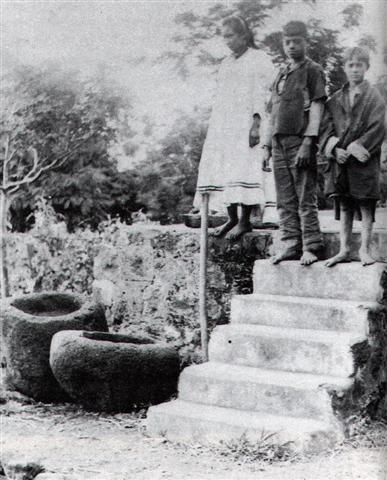 |
|
E:25 |
| i hoa era i te
ika ki uta he ki a Ira.ka
too mai |
After they had
thrown the fish on the beach, Ira
said, |
|
Too.
1. To adopt, to
take, to acquire, to admit, to
accept, to gather, to dispose, to
seize, to pull up, to extirpate,
stripped, to withdraw, to intercept,
to frustrate, to touch, to employ,
to serve; tae too, to
renounce. Mq.: too, to take,
to receive, to accept, to adopt, to
seize, to pull up. 2.
Raa too,
noon. 3. Numeral prefix. P
Mgv.: toko, id. Mq.: toko,
too, id. Ta.: too, id.
Samoa and Futuna use to'a and
toka, Tonga and Niuē use
toko, and the remainder of
Polynesia uses the latter form.
Tooa: kai tooa, intact,
entire, whole; paea tooa, to
deprive. Churchill.
Puhi. 1. To blow; to
light a fire; to extinguish, to blow
out; he-puhi te umu, to light
the fire for the earth oven. 2. To
fish for lobsters at night using a
bait (but during the day one calls
it hî); puhiga, night
fishing spot. Vanaga. To blow;
puhi mai, to spring up;
pupuhi, wind, fan, to blow,
puffed up, to blow fresh, to
ferment, to swell, to bloat, to
spring out, to gush, yeast;
pupuhi vai, syringe; pupuhi
eve, squirt; pupuhi heenua,
volley; pupuhi nunui, cannon;
pupuhi nui, swivel gun;
ahuahu pupuhi, amplitude; vai
pupuhi, water which gushes
forth; pupuhihia, to carry on
the wind; hakapupuhi, to
gush, leaven, volatilize;
puhipuhi, to smoke, to smoke
tobacco, a pipe. Churchill
Puku. 1. To feel an urge
to defecate or to urinate, etc.:
ku-puku-á te mimi: to need to
urinate. 2. Rock, boulder: puku
ma'ea; puku oone,
hillock, earth mound. 3. Puku
tagata, pubis. Puku-ine,
to get stuck in the oesophagus (of
food). Pukupuku, joints,
bones of a joint; pukupuku rima,
wrist bones; pukupuku va'e,
ankle. Pukuraga, followers,
disciples, students. Vanaga. 1.
Puku haga oao, east, east wind.
2. Pubes. T Mgv.: puku,
clitoris; pukuhou, the age of
puberty; pukutea, a man
between 30 and 45. 3. Unripe;
puku no, unripe; pukupuku,
green, immature. Mgv. puku,
to be unripe. Mq.: puku, a
fruit which has not yet reached its
maturity. 4. To gorge; mahaga
puku, to take the bait greedily.
PS Sa.: pu'u, to take the
whole at one mouthful, to put into
the mouth whole. Fu.: pukupuku,
to rinse the mouth, to gargle. Niuē:
puku,
to take into the mouth.
Pukuhina,
(puku
4), to choke on a fishbone. Pau.:
pukua,
to choke with a fishbone. Mgv.:
pukua,
to be suffocated by anything that
sticks in the throat. Mq.:
pukua,
bad deglutition. Ta.:
puunena,
puufeto,
to choke, to gag. Ha.:
puua,
to be choked, to have something
sticking in the throat.
Pukupuku;
1. Elbow. G. 2. Wrinkled, knotty,
wen, scrofula; gao
pukupuku,
scrofula. T Pau.: puku,
a swelling; pukupuku,
a wrinkle, knotty, rough. Mgv.:
puku,
a knot in the wood;
pukupuku,
knotted, rough, uneven, lumpy. Mq.:
puku,
knot in wood, boss, protuberance,
tumor, boil; pukupuku,
wrinkled, knotty. Ta.: puú,
boss, protuberance, swelling;
puúnono,
tumour; puúpuú,
wrinkled, knotty. Pukuraga,
servant T. Churchill.
Hu. 1. Breaking of wind. T
Mgv., uu, to break wind. Mq.,
Ta.: hu, id. 2. Whistling of
the wind, to blow, tempest, high
wind. P Pau.: huga, a
hurricane. Churchill. Mgv.: hu,
to burst, to crackle, to snap. Ha.:
hu, a noise. Churchill. |
|
Ahi. Fire; he-tutu i te
ahi to light a fire. Ahiahi
= evening; ahiahi-ata, the
last moments of light before
nightfall. Vanaga. 1. Candle, stove,
fire (vahi); ahi hakapura,
match; ahi hakagaiei,
firebrand waved as a night signal. P
Mgv.: ahi, fire, flame. Mq.:
ahi, fire, match, percussion
cap. Ta.: ahi, fire,
percussion cap, wick, stove. 2. To
be night; agatahi ahi atu,
day before yesterday. 3. Pau.:
ahi,
sandalwood. Ta.: ahi,
id. Mq.: auahi, a variety of
breadfruit. Sa.: asi,
sandalwood. Ha.: ili-ahi, id.
Ahiahi, afternoon, night;
kai ahiahi, supper. P Pau.,
Mgv., Mq., Ta.: ahiahi,
afternoon, evening. Ahipipi (ahi
1 - pipi 2) a spark, to
flash. Churchill.
Nau.
Sandalwood
which used to grow on the steep
slopes of the coast: nau opata.
Vanaga. The Sandalwood (Santalum)
tree. During the birdman ceremonies
at Orongo, a piece of
sandalwood was tied to the arm with
which the victorious birdman held up
the egg of the sooty tern.
Barthel 2.
... They walked
in crowds when they arrived at
Tulan, and there was no fire.
Only those with Tohil had it:
this was the tribe whose god was
first to generate fire. How it was
generated is not clear. Their fire
was already burning when Jaguar
Quitze and Jaguar Night
first saw it: 'Alas! Fire has not
yet become ours. We'll die from the
cold', they said. And then Tohil
spoke: 'Do not grieve. You will have
your own even when the fire you're
talking about has been lost',
Tohil told them.
'Aren't
you a true god! Our sustenance and
our support! Our god!' they said
when they gave thanks for what
Tohil had said.
'Very
well, in truth, I am your god: so be
it. I am your lord: so be it,' the
penitents and sacrificers were told
by Tohil. And this was the
warming of the tribes. They were
pleased by their fire. After
that a great downpour began, which
cut short the fire of the tribes.
And hail fell thickly on all the
tribes, and their fires were put out
by the hail. Their fires didn't
start up again. So then Jaguar
Quitze and Jaguar Night
asked for their fire again:
'Tohil, we'll be finished off by
the cold', they told Tohil.
'Well, do not grive', said Tohil.
Then he started a fire. He pivoted
inside his sandal ...
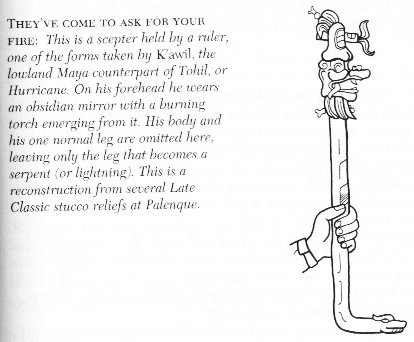 |
|
... According to
Gylfaginning, following the
murder of Baldr by Loki, the other
gods brought his body down to the
sea and laid him to rest on the
ship. They would have launched it
out into the water and kindled a
funeral pyre for Baldr but were
unable to move the great vessel
without the help of the giantess
Hyrrokkin,
who was sent for out of Jötunheim.
She then flung the ship so violently
down the rollers at the first push
that flames appeared and the earth
trembled, much to the annoyance of
Thor. Along with Baldr, his wife
Nanna was also borne to the funeral
pyre after she had died of grief. As
Thor was consecrating the fire with
his hammer Mjolnir, a dwarf named
Litr began cavorting at his feet.
Thor then kicked him into the flames
and the dwarf was burned up as well
...
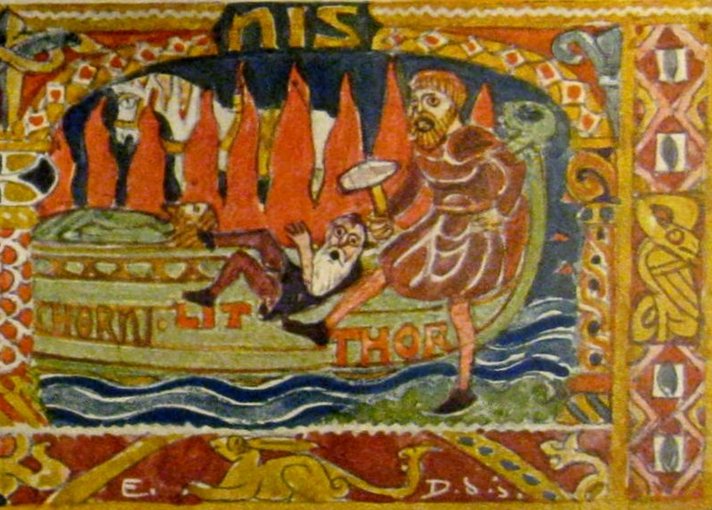 |
|
te
ahi ki
puhu ki
tunu te ika.he ui ka kore
he a(-) |
'Make a
fire and prepare the fish!' When
he saw that there was no fire [he
ui ka kore he ahi], Ira said,
'One of you go and bring the fire
from Hanga Te Pau'.
One of the young men went to the
fire, took the fire and provisions
(from the boat), turned around, and
went back to Hanga Hoonu. When he
arrived there [he tuu], he
sat down [he noho].
They prepared [he tunu]
the fish in the fire on the flat
rocks, cooked them, and ate until
they were completely satisfied.
Then they gave the name. 'The
rock, where (the fish) were prepared
in the fire with makoi (fruit
of Thespesia populnea?)
belongs to Ira'. |
|
hi he ki a
(i)ra.ka oho etahi ki
te ahi
ka
too |
| mai.mai hanga te
pau.he oho mai etahi kope |
|
ki
te ahi he
too atu
koia ko kai he hoki he oho |
| he tuu ki hanga
hoonu he tuu he noho he tunu i te |
| ika.i runga i te
papa he ootu he kakai ka ma(-) |
| konakona ro.he
nape i te ingoa.ko te papa tu(-) |
|
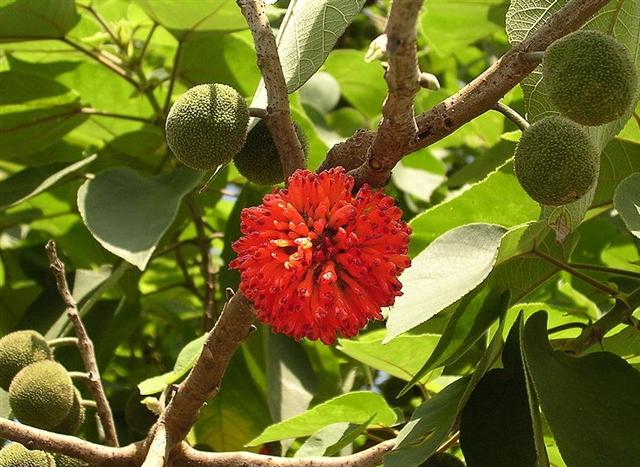
Makoi. The
tree which on T. was called miro,
Thespesia populnea. Van
Tilburg. Makoikoi, kidney T.
Churchill.
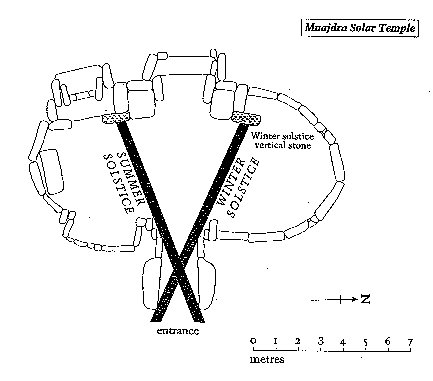
... The Mnajdra Temple is located on
Malta and very ancient, dating to
the time before the pyramids. Marija
Gimbutas: 'To sleep within the
Goddess's womb was to die and to
come to life anew'. In a system of
reincarnation the old one must die
in order to be reborn, of course. At
midsummer Sun comes to a standstill,
and this must therefore be an
occasion when the 'flame of life'
had to be transported into a new
body ... |
|
nu makoi a
Ira.he
noho erima raa i hanga ho(-) |
They remained in Hanga Hoonu for
five days. |
|
onu. |
... needfire ceremonies
usually take place near the summer solstice (the
Feast of St. John) ... but they occur in several
other seasons as well. The summer date of the
rite and its accompanying festival have to do,
among other things, with fertility, as can can
clearly be seen in a variant from the valley of
the Moselle preserved for us by Jakob Grimm.
Each household in the village was constrained to
contribute a shock of straw to the nearby high
place, Stromberg, where the males went at
evening while the females went to a spring lower
down on the slope. A huge wheel was wrapped with
this straw. An axle run through the wheel served
as the handles for those who were to guide it on
its downward plunge. The mayor of a nearby town
kindled the straw, for which office he was
rewarded with a basketful of cherries. All the
men kindled torches and some followed the
burning orb as it was released downhill to
shouts of joy. The women at the spring echoed
these shouts as the
wheel rushed by them. Often the fire went out of
its own accord before it reached the river, but
should the waters of the river extinguish it, an
abundant vintage was forecast for that year ...
|
kua tupu te mea ke |
kotîa
hia |
te kava tu |
|
Tia.
(Tiha G) .To sew. T Mgv.:
tia, to prick, to pierce,
to stick in. Churchill. Ta.:
tia, the lower belly. Mq.:
tia-kopu, pubes. Ma.:
tia, the lower abdomen.
Tiahonu, to piece together.
Mq.: tuhonu, to mend, to
patch. Ma.: tuhonu, to
join. Churchill. Mq.: tiaha,
drinking cup. Ha.: kiaha,
a cup, a mug. Tikao, to
dig out, to disembowel. Ma.:
tikaro, to dig out of a
hole. Churchill. KIA.
s. Haw., pillar or inner
post of a house supporting the
roof, any kind of pillar or
post, a mast of a vessel;
kia-aina, a supporter of the
land, a governor of a province.
Marqu., tia, id. Sam.,
ti'a, the stick used in
tanga-tia, a man's head
(abusively); tia-pula,
taro-tops cut off for planting.
Sunda, tihang. Mal.,
tiang, a pillar. Greek,
κιων,
a pillar, support of the roof,
the identical sense of the
Polynesian usage of the word.
Liddell and Scott give no
etymology or connections of
κιων.
(Fornander)
Koti.
Kotikoti. To cut with
scissors (since this is an old
word and scissors do not seem to
have existed, it must mean
something of the kind). Vanaga.
Kotikoti. To tear;
kokoti, to cut, to chop, to
hew, to cleave, to assassinate,
to amputate, to scar, to notch,
to carve, to use a knife, to cut
off, to lop, to gash, to mow, to
saw; kokotiga kore,
indivisible; kokotihaga,
cutting, gash furrow. P Pau.:
koti, to chop. Mgv.:
kotikoti, to cut, to cut
into bands or slices; kokoti,
to cut, to saw; akakotikoti,
a ray, a streak, a stripe, to
make bars. Mq.: koti,
oti, to cut, to divide. Ta.:
oóti, to cut, to carve;
otióti, to cut fine.
Churchill. Pau.: Koti, to
gush, to spout. Ta.: oti,
to rebound, to fall back.
Kotika, cape, headland. Ta.:
otiá, boundary, limit.
Churchill. |
 |
 |
 |
 |
 |
|
Cb6-19 |
Cb6-20 |
Cb6-21 (136) |
Cb6-22 |
Cb6-23 → 6 * 23 = 186 |
|
CLOSE TO THE FULL MOON: |
|
"July 18 |
19 (200) |
20 |
21 |
22 / 7 → π |
|
φ Hydrae
(160.3) |
no star listed (161) |
VATHORZ POSTERIOR = θ Carinae
(162.1),
PEREGRINI = μ Velorum,
η Carinae
(162.6) |
ν Hydrae (163.1) |
no star listed (164)
ALTAIR (α Aquilae)
|
|
... This [η
Carinae] is one of the most
noted objects in the heavens,
perhaps even so in almost
prehistoric times, for
Babylonian inscriptions seem to
refer to a star noticeable from
occasional faintness in its
light, that Jensen thinks was
η. And
he claims it as one of the
temple stars associated with Ea,
or Ia, of Eridhu¹, the Lord of
Waters, otherwise known as
Oannes², the mysterious human
fish and greatest god of the
kingdom.
¹ Eridhu, or
Eri-duga, the Holy City, Nunki,
or Nunpe, one of the oldest
cities in the world, even in
ancient Babylonia, was that
kingdom's flourishing port on
the Persian Gulf, but, by the
encroachment of the delta, its
site is now one hundred miles
inland. In its vicinity the
Babylonians located their sacred
Tree of Life.
² Berōssōs
described Oannes as the teacher
of early man in all knowledge;
and in mythology he was even the
creator of man and the father of
Tammuz and Ishtar, themselves
associated with other stars and
sky figures. Jensen thinks
Oannes connected with the stars
of Capricorn; Lockyer finds his
counterpart in the god Chnemu of
Southern Egypt; and some have
regarded him as the prototype of
Noah ...
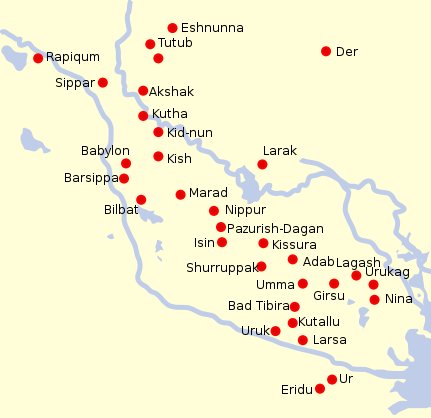 |
|
HANGA HOONU |
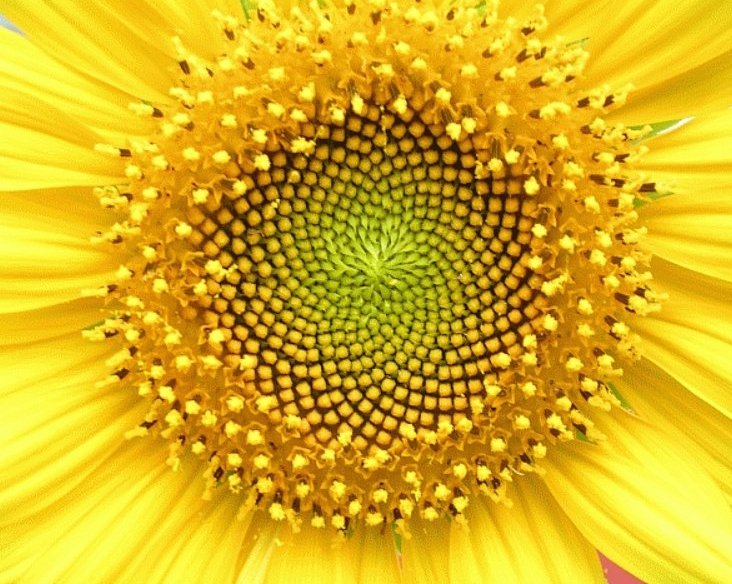
|
Egyptian bread, (-t,
female determinant) |
 |
Phoenician qoph |
 |
Greek
phi |
Φ(φ) |
|
... is the
21st letter of the Greek
alphabet ... Its origin is
uncertain but it may be that
phi originated as the letter
qoppa ... In traditional
Greek numerals, phi has a
value of 500 or 500000 ...
Isaac Taylor, History of
the Alphabet: Semitic
Alphabets, Part 1, 2003:
'The old explanation, which
has again been revived by
Halévy, is that it denotes
an 'ape,' the character Q
being taken to represent an
ape with its tail hanging
down. It may also be
referred to a Talmudic root
which would signify an
'aperture' of some kind, as
the 'eye of a needle,' ...
Lenormant adopts the more
usual explanation that the
word means a 'knot' ...

... The king, wearing now a
short, stiff archaic mantle,
walks in a grave and stately
manner to the sanctuary of
the wolf-god Upwaut,
the 'Opener of the Way',
where he anoints the sacred
standard and, preceded by
this, marches to the palace
chapel, into which he
disappears. A period of time
elapses during which the
pharaoh is no longer
manifest.
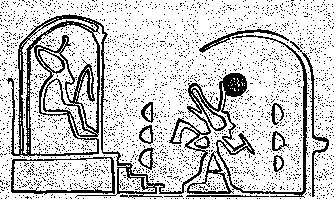
When he reappears he is
clothed as in the Narmer
palette, wearing the kilt
with Hathor belt and
bull's tail attatched. In
his right hand he holds the
flail scepter and in his
left, instead of the usual
crook of the Good Shepherd,
an object resembling a small
scroll, called the Will, the
House Document, or Secret of
the Two Partners, which he
exhibits in triumph,
proclaiming to all in
attendance that it was given
him by his dead father
Osiris, in the presence
of the earth-god Geb.
'I have run', he cries,
'holding the Secret of the
Two Partners, the Will that
my father has given me
before Geb. I have
passed through the land and
touched the four sides of
it. I traverse it as I
desire.' ...
.jpg) |
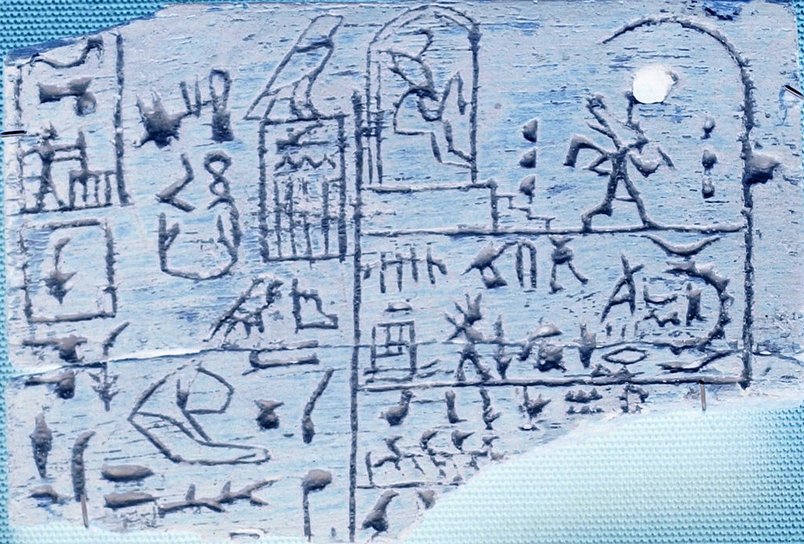
... Ebony label
EA 32650 from Den's tomb. The
upper right register depicts king
Den twice: at the left he is sitting
in his Hebsed pavilion, at the right
he is running a symbolic race around
D-shaped markings. This ceremony is
connected to the so-called 'race of
the Apis bull'. The middle right
section reports about the raid of
the city 'beautiful door' and about
a daughter of Den suffering from an
unknown disease. The lower right
section reports about the visitation
of the 'souls of Peh' at the royal
domain 'Wenet'. The left part of the
label describes the content of the
vessel that once belonged to the
label and mentions the high official
Hemaka, who was obviously
responsible for the delivery of the
labeled jar ...
|











.jpg)
